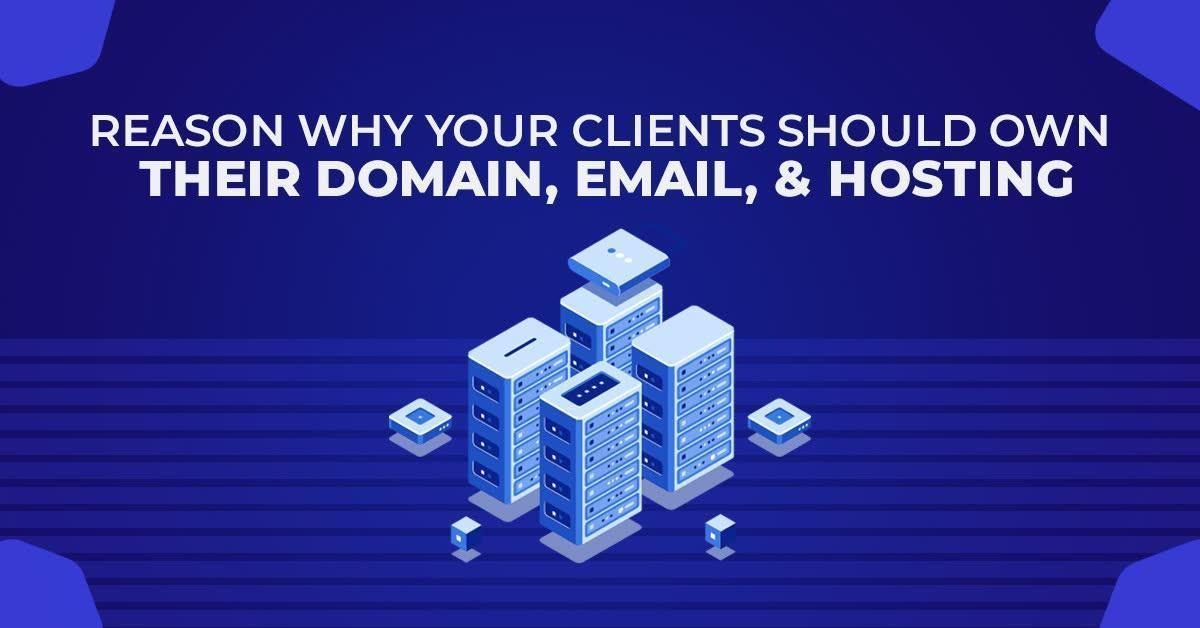Reason Why Your Clients Should Own Their Domain, Email, And Hosting
Clients owning their domain, email, and hosting can save themselves all the trouble of depending on others to get the work done. Making sure to not let the third party carry out functions on your behalf can avoid a lot of concerns. It is encouraged to let third-party services help during the initial stages of setting up but after a few years when the client has gained enough experience, they can take complete control over their domain, hosting, and email services.
- If a client does not get full control over the domain, the consequences can be tremendous.
- If the domain stops pointing to your customer’s website, any search ratings that were achieved over time will disappear.
- When the domain expires, it can be picked up by a different client. A competitor should sign in the domain and factor it into their own website.
- Every second of downtime in a site is a direct hit to the lowest line.
Remember, all of the important features that rely upon e-mail: financial institutions, authorities’ groups, utilities, etc. Not to forget the exclusive statistics and confidential enterprise communications that come via email.
Set Your Customers Up For Achievement
A web professional will want to provide their customers with great service while heading off capacity pitfalls. Furthermore, they will also want to mitigate unintended dangers and liabilities for each person involved. That’s why it’s an awesome business plan to plot for ownership in advance.
Right here are a few recommendations for empowering your clients and letting them maintain their control over their domain, email, and hosting:
1. Make Product Purchases
Walk your customers properly in a step-by-step manner while buying the domain, electronic mail, and web hosting at the beginning of the project. This indicates that you’re dedicated to your job, are interested in maintaining a long-time partnership, and that you make the right decisions on their behalf.
Some tactics to remember:
- A sheet similar to a to-do list should be created. It should contain accurate, in-depth step-by-step instructions on what products should not be forgotten, what to buy, and clear directions on the way to set things up.
- Walk your clients through the procedure. They’ll appreciate the support and assistance.
- Recommend the right products that should be purchased for their enterprise, and make sure to finish the setup on their behalf.
2. Provide Your Personal Website Hosting Services
A few application designers and developers choose to maintain and provide aid to a month or annual retainer. Make sure your clients do not worry about this and on the other hand it’s a pleasant bite of recurring sales for you.
Reseller web hosting plans and Reseller applications have their professional pros and cons, so ensure that something you select fits right into your business model. In either case, your client may have their personal account, despite the fact that they are purchasing the hosting service from you.
3. Switch Account Ownership For Your Client
What if you have already got possession of your consumer’s area name? Shifting ownership is fantastically smooth. If your customer’s site is on a hosting account that you personally own, you could migrate their website to a hosting account that they personally own. In the event that they don’t have a hosting account already, guide them through the steps involved in selecting and buying the proper hosting plan, and assist them to set it up, after which they migrate the website over to the other.
The migration process varies depending on how the website is built. Electronic mail migration is a tricky process. It relies upon how the email debts have been first of all configured, i.e. if it is a workplace 365, G Suite, or POP email web hosting account. To make electronic mail migration as seamless as possible, you could get in touch with the guidance group for the email website hosting company that your customers are migrating to. The customer support group is normally very happy to convey a brand new purchaser onto their platform.
4. Regaining Control From Someone Else
When the accounts of your clients are managed by a previous (and possibly unresponsive) web designer or developer, the exceptional thing you could do is, be patient and provide assistance. Connect with whoever is currently responsible for the account. Give an explanation regarding the situation and why your client is migrating to a different service provider.
Most of the time the current owner of the account will be cooperative and understanding. In case the current account owner is not said to be very cooperative, your clients will want to contact the present service provider.
Note: In case, your customer’s website and email are currently hosted on a shared account with restrained get entry to, you would possibly have to get creative together with your trouble fixing.
For instance, you might need to rebuild the website from scratch. For e-mail, you would possibly need to manually migrate electronic mail records or run an e-mail migration wizard on whatever provider your customers are shifting to. It all relies upon your purchaser’s precise situation.
5. Ownership Information
It is important to be proactive in mentioning the details of your clients’ ownership contracts. The contract should include details about the hosting server, domain, and mail accounts. The contract should be clear to mention the roles and responsibilities of the clients, who will own it.
Make sure that the customer has a suitable level of access to maintain, manage, and host the accounts. Pay additional concentration on the cancellation policy. Make sure to showcase your diligence by showing professionalism while putting forth very clear expectations
Conclusion
Owning the domain, email, and hosting is a huge advantage to the respective client. It avoids unnecessary concerns that might occur in the long run. It is a lot safer to keep the client’s data in a domain that is registered to them. So it is always good to make the clients switch from renting a domain to owning one, eventually.





































